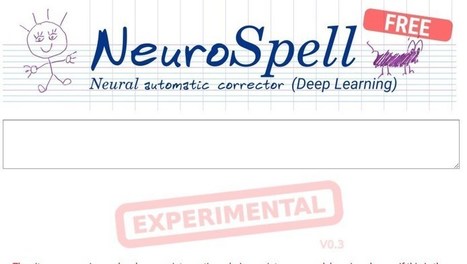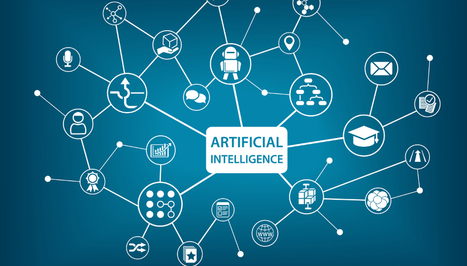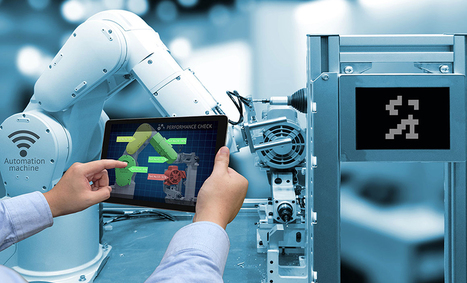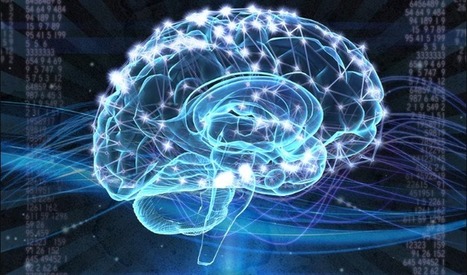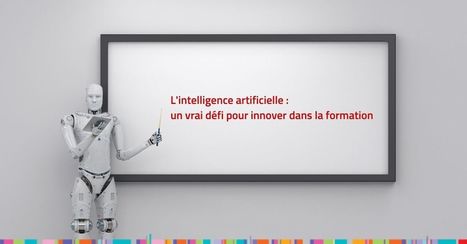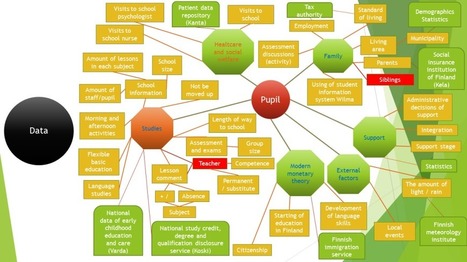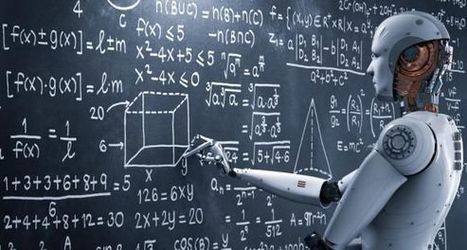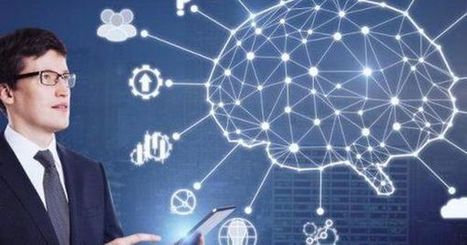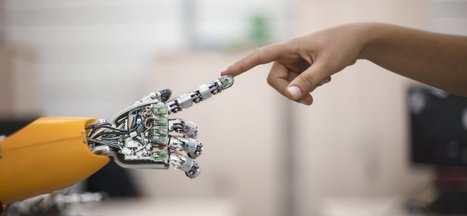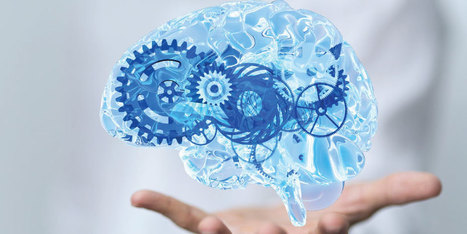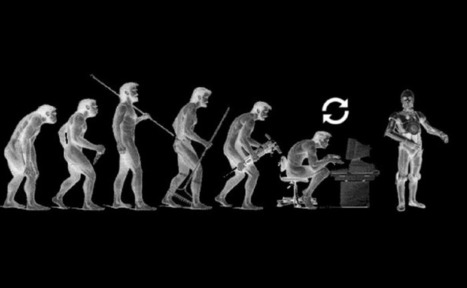 Your new post is loading...
 Your new post is loading...
Interview en ligne - vidéo disponible
L’Intelligence Artificielle (IA), et notamment ses composantes Machine Learning (ML) et Deep Neural Nets (DNN) connaît un engouement et des succès considérables dans de très nombreux domaines applicatifs. Citons l’aéronautique, les transports, la santé, la finance, l’IT. Après avoir initié en 2017 les Mons AI Meetups, différents services d’Enseignement et de Recherche de la Faculté …
Neurospell est un outil de correction automatique expérimental très impressionnant qui fait appel à l'intelligence artificielle.
Artificial Intelligence (AI) has been quietly infiltrating society in every way. Tom shares how AI is being used to improve education.
Via Grant Montgomery
L’intelligence artificielle conduira à des transformations profondes du travail. Pour s’y préparer, le rapport passe au crible trois secteur
Via François GARREAU, Patrick Bouillaud
L'année 2018 va voir se multiplier les applications opérationnelles de l'IA. Marketing, maintenance, logistique
Via Jean-Pierre Blanger
La transformation digitale des entreprises, l’apparition des robots dans tous les secteurs d’activité, l’omniprésence de l’Intelligence artificielle, autant de mutations qui enthousiasment ou inquiètent, selon les cas, mais qui posent toutes débat. Jean-Frédéric Real, Directeur de l’Innovation de Scalian, un groupe français spécialiste des systèmes numériques, apporte sa pierre à cette réflexion. Pour lui, rien ne peut se faire sans mettre l’humain au centre de tous les dispositifs.
Via François Pellerin
Large-scale data gathering and quantum leaps in processing power have set the table for major advancement in artificial intelligence. Yet there’s a growing body of evidence that the field of AI is poised to move into a whole new dimension, one where AI not only imagines the real world, but can begin to make accurate decisions on what’s real and important, what’s not — and thus predict what’s coming next. “Computers are really good at memorization,” Carl Vondrick, research scientist at Google Inc., said during a presentation at the Re-Work Deep Learning Summit in San Francisco Thursday. “The problem is teaching them how to forget.” Vondrick’s research has focused on one of the most vexing challenges in today’s online world: how to make use of the massive database of unlabeled videos that clog nearly every corner of the web. It’s one thing to swoon over a cute baby or funny cat video. It’s another to learn from it. The Google research team decided the best approach was to use millions of unlabeled video hours to train deep learning neural networks to reach a better understanding of the world. By drawing on the vast cache of freely available footage, the AI-enabled network could correctly interpret not only what it saw, but what would happen next. In examples presented at the conference, Vondrick showed videos of people approaching each other and then the network decided, mostly correctly, what action would occur as a result. A hug, handshake or “high five” was often the behavior based on the human interaction captured on video. The deep learning research is important because growing dependence on robots will demand that the machines be able to interpret human actions as observed. If a human reaches for a doorknob, it would be highly inconvenient if the robot decides to slam the door. Intriguingly, the Google researchers have been extending the deep learning model to include sound as well. Summit attendees heard a clip of people singing “happy birthday” and as the video image was revealed, it showed that the network correctly predicted there would be an image of a candle in the segment. At 74 percent accuracy, deep learning systems are coming along well at predicting action, getting closer to human rates approximately 10 percentage points higher, according to Vondrick. “This task is still pretty hard and we don’t always get it right,” Vondrick admitted. Vondrick’s research is based on a methodology known as adversarial learning, which essentially pits two networks in competition with each other. One network generates real images and the other is tasked with analyzing them and rendering a decision on whether they are genuine or fake. This technique has also been recently employed by Ian Goodfellow, staff research scientist at Google Brain, who has become a leading authority in “generative adversarial networks” or GANs. In Goodfellow’s work, GANs create photos and sounds of the real world. “GANs are generative models based on game theory,” Goodfellow explained. “They open the door to a wide range of engineering tasks.” These tasks encompass a variety of deep learning models where machines can be asked to turn a brown horse into a zebra.
“ Vous vous êtes déjà demandé s'il pourrait y avoir une nouvelle guerre mondiale et, si oui, ce qui en serait la cause ? Elon Musk pense avoir la réponse. ”
Via JP Fourcade, Claude Tran, Profleluherne
“ En thèse CIFRE convention industrielle, Caroline Etienne est doctorante de l'université Paris-Saclay. Son laboratoire de rattachement est le LIMSI-CNRS et son entreprise est DREAMQUARK, une start-up de logiciel deep-learning pour les banques et les assurances.”
Via CNRS Sciences informatiques, Claude Tran
From a kindergartener getting a participation ribbon at his swim meet to a Nobel Prize winner having her life’s work …
“Human plus machine isn't the future, it's the present,” Garry Kasparov said in a recent TED talk. And this “present” is transforming the world of education at a rapid pace. With children increasingly using tablets and coding becoming part of national curricula around the world, technology is becoming an integral part of classrooms, just like chalk and blackboards. We have already witnessed the rise and impact of education technology especially through a multitude of adaptive learning platforms such as Khan Academy and Coursera that allow learners to strengthen their skills and knowledge.
Via Edumorfosis, Fernando de la Cruz Naranjo Grisales
|
L'IA sera un vrai défi pour innover dans la formation. Objectifs : permettre aux apprenants de mieux se former et aux formateurs de pouvoir les accompagner.
Via Bhushan Thapliyal
Aux Etats-Unis comme en Europe, des outils intégrant l’intelligence artificielle prétendent répondre aux difficultés scolaires. Individualiste et technocratique, l’approche néglige les finalités éducatives essentielles : l’esprit critique, la réflexion et l’argumentation. IA
Via Sandrine Decamps
VIDÉO. Remis mercredi 27 mars 2018, le rapport de Cédric Villani dédié à l’intelligence artificielle recense toute une série de recommandations pour faire de la France un "leader" sur le sujet. Parmi les pistes évoquées pour l’enseignement supérieur et la recherche, figure la création d’instituts de recherche interdisciplinaires. Marc Schoenauer, directeur de recherche à l’Inria, en détaille les enjeux, lors de la conférence EducPros du 28 mars. (...) - EducPros, par Céline Authemayou, 29/03/2018
Via ESR_Info
AI isn't going to be the major job killer that many fear.
Nothing is “artificial” about this technology. It is made by us, for us.
Via Jean-Pierre Blanger
...AlphaGo a appris en copiant le raisonnement humain via l’usage du deep learning. C’est à dire en analysant un volume considérable de parties afin de détecter les automatismes qui lui ont permis de...
Via Patrick Bouillaud
According to an Oxford University analysis, close to half of all jobs will be taken over by robots in the next 25 years. No wonder the press is full of handwringing about how workers will adjust and the best way to prepare the next generation for this A.I.-filled future.
But not everyone is alarmed about the prospect of radical change in the labor market. After all, this has happened before (for instance, when mechanization replaced the vast majority of farmers) and it turned out OK. Plus, a lot of today's jobs are soul-crushingly boring and repetitive. Losing them just might be a blessing.
Among these optimists are IT service company Cognizant. In a recent report (hat tip to Business Insider for the pointer), the consultancy notes that while creative destruction has always been with us, so has reinvention. Sure, robots will take jobs away, but they'll also create new ones.
What will these new gigs look like exactly? The report imagines detailed job ads for 21 future careers that Cognizant thinks may emerge in the next 10 years.
Via John Evans
En cette rentrée 2017 IFP School a souhaité tester le concept de "Learning Escape Game" (NDLR : "jeu d'évasion grandeur nature" (confère Olivier Bernaert)) afin d’enseigner la collaboration et le travail d’équipe à ses étudiants. Pendant 2 jours, 350 étudiants répartis (tous programmes confondus) dans des groupes de 15 participants avaient 10 minutes pour affronter une intelligence artificielle nommée "Wise".
Mise en situation, musique, costumes, chronomètre et énigmes : mobilisation de tous les codes du storytelling pour créer de l’émotion et de l’engagement… Dès leur arrivée en salle de cours, les participants recevaient une tablette sur laquelle un chatbot (NDLR : "robot logiciel pouvant dialoguer avec un individu ou consommateur par le biais d’un service de conversations automatisées effectuées en grande partie en langage naturel" selon le site définitions-marketing) leur donnait les consignes et les mettait au défi de résoudre en 10 minutes l’ensemble des énigmes des deux salles de jeu. Difficulté supplémentaire, ils devaient d’abord trouver la solution des quatre premières énigmes avant de pouvoir accéder à la seconde salle ! Sachant que les énigmes portaient sur des sujets très divers (équations de thermodynamique, courbes d’économie des énergies, inspection de site industriel) et avec des technologies variées (réalité virtuelle, réalité augmentée, puzzle) les élèves étaient obligés d’échanger et de collaborer pour trouver les solutions.
Sur l’ensemble des groupes, 12 ont réussi à sortir des deux salles avant la fin du temps imparti et tous continuaient à parler des énigmes et à échanger sur les solutions à la sortie de la salle. Un beau succès !
Si la mise en place d’un escape game s'est vite révélée comme une évidence pour répondre à l'objectif de collaboration et d’ancrage des informations, le choix du chatbot était quant à lui un vrai challenge, car son utilisation induit un changement de posture où l’enseignant devient un guide fournissant des éléments méthodologiques et motivationnels afin que chaque étudiant construise son propre parcours d’apprentissage.
Constat : devant un chatbot les participants censurent moins leurs réponses et ils échangent beaucoup plus entre eux sans avoir peur de déranger le cours ou de suggérer de fausses réponses. L’enseignant a alors toute la liberté pour observer le groupe, inciter ceux qui sont plus en retrait à échanger et les guider dans la méthodologie de résolution de problème.
Le bilan de projet est donc très positif. La mise en place a été rapide et peu coûteuse. Les tâches les plus longues ont été l'élaboration de l’arbre des choix du chatbot sous motion.ai (gratuit en dessous de 1000 "chat") et la définition des objectifs pédagogiques. Quant à la création des énigmes, elle est partie du matériel déjà présent dans la salle (casiers, vidéo projecteur, horloge, tableaux…) et des cours déjà montés. Le feedback des participants a lui aussi été très positif (étonnement devant la modernité et la diversité des méthodes de formation utilisées à l’école, notamment).
Les enseignants ont pris conscience qu'ils disposent là d'un nouveau terrain de jeu, en particulier en matière d'évaluation des acquis concrets des étudiants, et d'une plus grande efficience pédagogique sous réserve d'adaptation de leur modèle de transmission des savoirs. Le learning escape game est donc un bon moyen de repenser le modèle vertical de transmission du savoir de manière ludique.
Pour plus d'information sur les Learning Escape Games : LearningScape de Sapiens-USPC
Lucie Dhorne
Via Vedrenne Guy
The term “Big Data” may have been around for some time now, but there is still quite a lot of confusion about what it actually means. In truth, the concept is continually evolving and being reconsidered, as it remains the driving force behind many ongoing waves of digital transformation, including artificial intelligence, data science and the Internet of Things. But what exactly is Big Data and how is it changing our world?
Via Elke Höfler, Profleluherne
D’ici 2030, la Chine ambitionne de devenir le numéro un mondial dans le domaine de l'intelligence artificielle, menaçant la domination des Etats-Unis.
Insatisfait de la couverture médiatique de l’Intelligence Artificielle, le chercheur Zachary C. Lipton a lancé le blog Approximately Correct pour faire entendre une voix dissonante. Selon lui, de nombreux articles consacrés au sujet pêchent par approximation et relaient des prophéties spectaculaires au détriment des véritables enjeux. Explications.
Via Rémi Brossard
|
 Your new post is loading...
Your new post is loading...
 Your new post is loading...
Your new post is loading...














